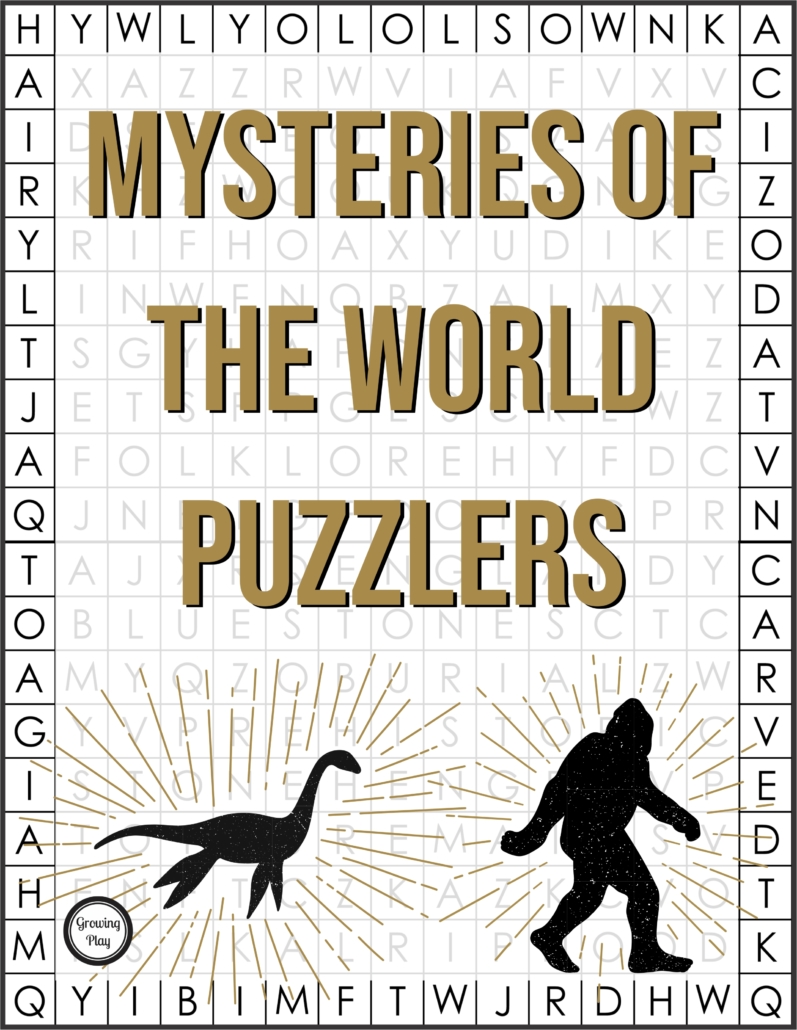January 29 – National Puzzle Day

Today, January 29, is a special day because it’s National Puzzle Day! Puzzles are not just fun, but they also help our brains grow and learn new things. Whether you love jigsaw puzzles, word searches, or brain teasers, today is the perfect day to celebrate them. For more interesting facts, you can check out all of the Fact of the Day for Kids here.
FIVE FUN FACTS ABOUT NATIONAL PUZZLE DAY
- National Puzzle Day was created to celebrate the enjoyment and educational benefits of puzzles.
- The world’s largest jigsaw puzzle had 551,232 pieces and measured over 76 x 54 feet.
- Crossword puzzles first appeared in newspapers in the early 20th century.
- Rubik’s Cube, one of the most famous puzzles, was invented in 1974.
- Sudoku, a number puzzle, originated in Japan and became a worldwide phenomenon in the 21st century.

Mysteries of the World Word Search Puzzlers Packet
ACTIVITY IDEAS TO CELEBRATE JANUARY 29
Today is a great day to enjoy puzzles in all their forms! Here are five fun activities to celebrate National Puzzle Day:
- Attempt a challenging jigsaw puzzle with family or friends.
- Create your own crossword or word search puzzle.
- Try solving a Rubik’s Cube or a similar brain-teaser puzzle.
- Organize a puzzle-themed scavenger hunt.
- Have a puzzle swap with friends to share and solve different puzzles.
- How quickly can you solve these backward puzzles?
QUESTIONS TO THINK ABOUT FOR JANUARY 29
Let’s think deeper about puzzles and what makes them so fascinating. Here are some questions to ponder:
- Why do people enjoy solving puzzles?
- How do puzzles help our brains grow?
- What is the hardest puzzle you have ever tried to solve?
- Can puzzles be more than just games?
- What kind of puzzles haven’t been invented yet?

Detective Puzzle Pack
WOULD YOU RATHER QUESTIONS FOR JANUARY 29
Here are a few questions to spark conversation. Would you rather…
- Solve a 1000-piece puzzle alone or a 100-piece puzzle with friends?
- Only do crossword puzzles or only jigsaw puzzles for a year?
- Create a new puzzle or solve an existing world-famous puzzle?
- Have a puzzle with missing pieces or a puzzle that’s too easy to solve?
MORE FUN STUFF
Here are more fun ideas to help keep the kids entertained:
- Check out these 100 hard word search puzzles – Printable
- Enjoy these Printable crossword puzzles for kids
- Learn about the Benefits of word searches
- Don’t miss out on even more fun facts for kids here
WHY PUZZLES BENEFIT THE BRAIN
Puzzles are not just a fun activity, they also have amazing benefits for our brains! When we work on puzzles, we’re actually exercising our brains in several ways:
- Improves Problem-Solving Skills: Puzzles require us to think critically and devise strategies to solve problems. This kind of thinking enhances our ability to solve challenges in real life.
- Enhances Memory: Working on puzzles improves short-term memory. Remembering shapes, colors, and puzzle pieces, and visualizing where they fit enhances our memory recall.
- Increases IQ: Studies suggest that regular puzzle-solving can increase your IQ (Intelligence Quotient) by as much as 4 points. Puzzles encourage us to learn, reason, and think logically.
- Improves Concentration: Puzzles require focus. This concentration can improve our overall attention span and ability to concentrate on other tasks.
- Reduces Stress: Engaging in puzzles can be very relaxing. The concentration required for puzzle-solving can lead to a state of mindfulness, similar to meditation, which reduces stress and anxiety.
- Enhances Visual-Spatial Reasoning: When assembling a puzzle, we have to figure out how different pieces fit together within a space, which improves visual-spacial reasoning skills.
- Promotes a Growth Mindset: Finally, completing puzzles, especially challenging ones, can boost confidence and promote a growth mindset, teaching us that with persistence, we can solve complex problems.
So, the next time you’re working on a puzzle, remember you’re not only having fun but also giving your brain a fantastic workout!


